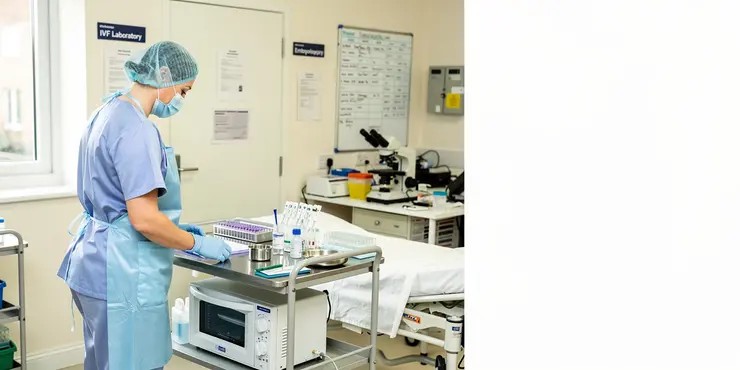
Find Help
More Items From Ergsy search
-
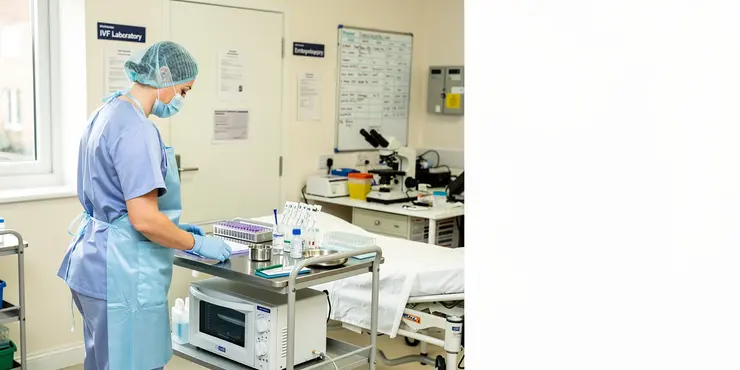
What is the role of the embryologist in IVF?
Relevance: 100%
-
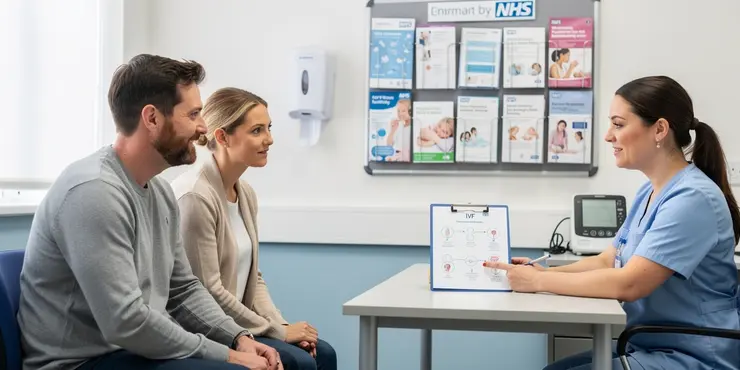
How does IVF work?
Relevance: 50%
-

What is IVF and how does it work?
Relevance: 49%
-

What are the main steps in an IVF cycle?
Relevance: 47%
-

How long does an IVF cycle take?
Relevance: 46%
-

Is IVF successful?
Relevance: 46%
-

What is IVF?
Relevance: 46%
-

Are there risks associated with IVF?
Relevance: 44%
-

Who might need IVF?
Relevance: 43%
-

Does IVF guarantee pregnancy?
Relevance: 43%
-
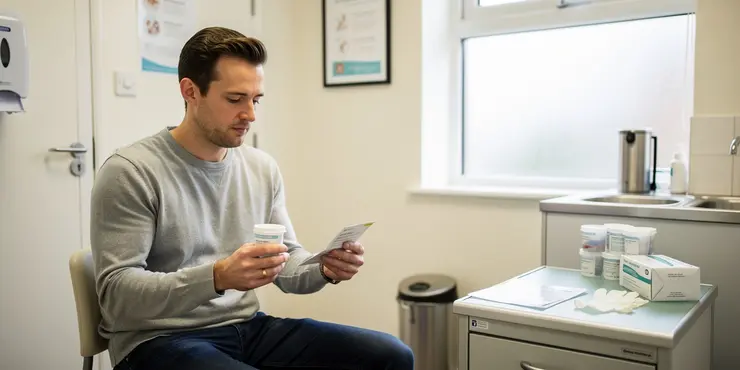
How is the sperm used in IVF?
Relevance: 42%
-
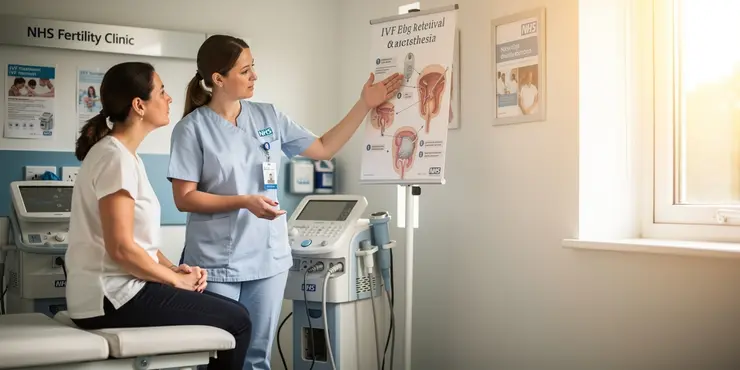
Does IVF require anesthesia?
Relevance: 42%
-
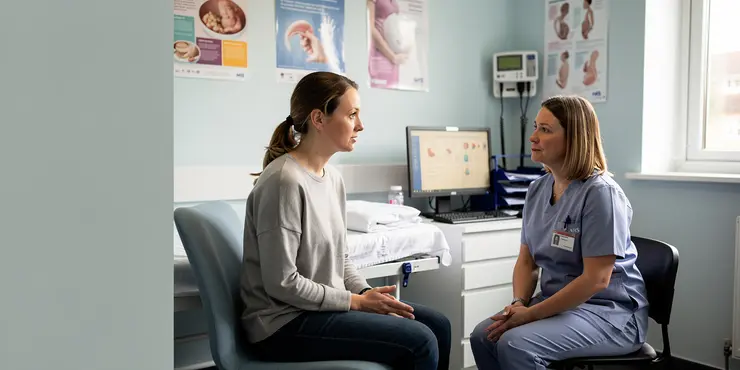
IVF Fertility Treatment from MumsNet
Relevance: 42%
-

How are embryos transferred during IVF?
Relevance: 41%
-

Infertility - IVF Treatment and Patient Information
Relevance: 41%
-

Can IVF be used for gender selection?
Relevance: 40%
-
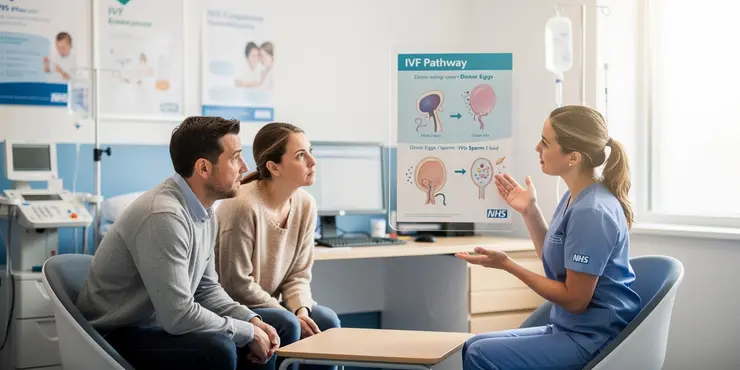
Can IVF be done with donor eggs or sperm?
Relevance: 39%
-

What should I expect during IVF treatment?
Relevance: 39%
-

How do clinics determine if IVF is the right option?
Relevance: 39%
-

How many embryos are usually transferred in IVF?
Relevance: 38%
-
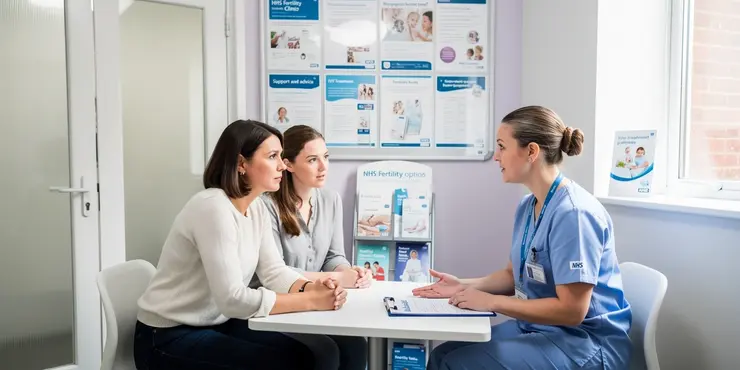
Fertility treatments on the up, but not via the NHS
Relevance: 18%
-
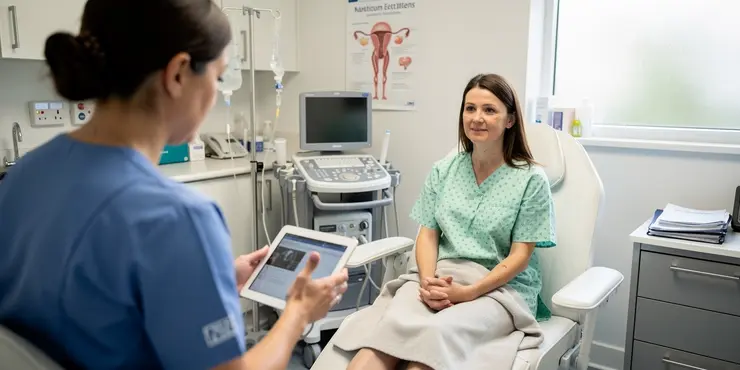
What is egg retrieval?
Relevance: 17%
-

Female infertility explained
Relevance: 15%
-

How to apply for NHS funding to treat infertility
Relevance: 13%
-

What happens to unused embryos?
Relevance: 10%
-

Is it safe for a partner of someone with HIV to have children?
Relevance: 6%
-

Can medications affect pregnancy test results?
Relevance: 6%
-

What are the reasons for female infertility?
Relevance: 6%
-

Can Huntington's disease be prevented?
Relevance: 6%
-
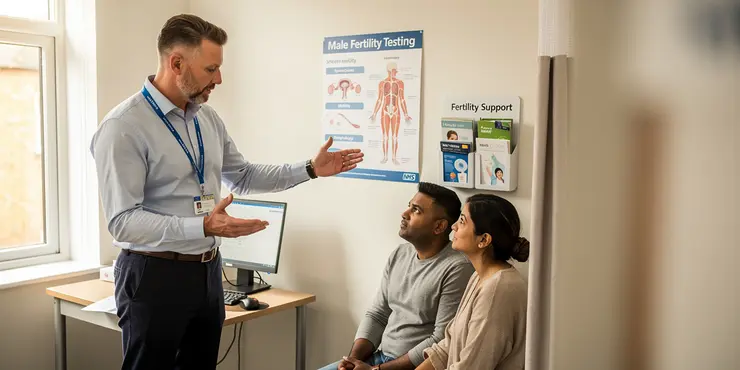
Ian Stones - Test him - Male Infertility
Relevance: 4%
-
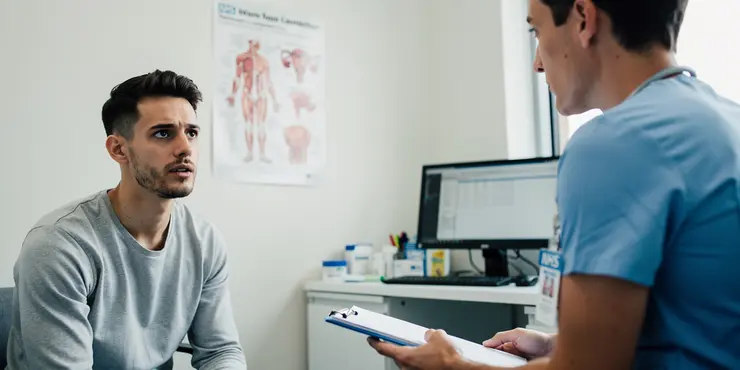
Is fertility affected by testicular cancer?
Relevance: 3%
The Role of the Embryologist in IVF
Embryologists play a crucial role in the process of In Vitro Fertilisation (IVF), which is a significant fertility treatment option available for many individuals and couples in the UK. Their responsibilities span across various stages of the IVF process, ensuring the best possible chances of successful conception and pregnancy.
Egg Collection and Sperm Preparation
One of the first roles an embryologist undertakes is assisting with the egg collection process. They assess the retrieved eggs to determine their quality and maturity. Meanwhile, they also prepare the sperm sample provided by the partner or donor. The sperm preparation involves isolating and concentrating the motile sperm to use in fertilising the eggs. Ensuring the highest quality gametes is essential for successful fertilisation and embryo development.
Fertilisation
Embryologists are responsible for facilitating the process of fertilisation. This is typically done using one of two methods: conventional insemination, where thousands of sperm are placed with each egg, or Intracytoplasmic Sperm Injection (ICSI), where a single sperm is directly injected into an egg. The choice of method depends on the specific circumstances and fertility issues faced by the patients. Embryologists are skilled in performing ICSI and making decisions that maximise the likelihood of successful fertilisation.
Embryo Culture and Monitoring
Once fertilisation is successful, embryologists monitor the development of the embryos in a controlled laboratory environment. They evaluate embryo quality and development over several days. Advanced technologies and imaging techniques are utilised to observe cell division and growth, with embryologists looking for specific indicators that predict the viability of embryos. This step is critical, as selecting the best quality embryos is pivotal in increasing the chances of successful implantation and pregnancy.
Embryo Transfer and Cryopreservation
Before the embryo transfer, embryologists select the best embryos based on their developmental progress. They collaborate with fertility specialists to determine the optimal timing and procedures for embryo transfer into the uterus. Additionally, embryologists are responsible for cryopreservation, which involves freezing surplus embryos for potential future use. This offers patients additional chances for conception without undergoing another full IVF cycle.
Quality Control and Research
Embryologists are also involved in maintaining rigorous quality control standards in the IVF laboratory. They ensure that all equipment and protocols are functioning correctly and efficiently, safeguarding the integrity of the IVF process. Moreover, embryologists often engage in research to advance the field of reproductive science, seeking innovations that improve the success rates and accessibility of IVF treatments.
In summary, embryologists are indispensable in the IVF process, from gamete preparation to embryo transfer and beyond. Their expertise and precision are fundamental in helping individuals and couples in the UK achieve their dreams of parenthood.
The Role of the Embryologist in IVF
Embryologists are very important in helping people have babies through a process called In Vitro Fertilisation (IVF). IVF is used by many people in the UK who need help to have a baby. Embryologists help at each part of the process to make sure it goes well.
Egg Collection and Sperm Preparation
The first thing embryologists do is help collect eggs from the woman. They check the eggs to make sure they are good and ready. At the same time, they prepare the sperm from the man or a donor. They pick the best sperm to try to make an embryo. Good sperm and eggs are needed to make a healthy embryo.
Fertilisation
Embryologists help with fertilisation, which is how the sperm meets the egg to start an embryo. This can be done in two ways. One way is putting a lot of sperm with the egg. The other way is to put one sperm right inside the egg. This choice depends on what is best for the people trying to have a baby. Embryologists are very good at doing this important step.
Embryo Culture and Monitoring
When fertilisation works, embryologists watch the embryos grow in a special lab. They check to make sure the embryos are developing well. They use special equipment to see how cells divide and grow. This helps them pick the best embryos to use for pregnancy, which gives a better chance for success.
Embryo Transfer and Cryopreservation
Before putting the embryo back into the woman, embryologists pick the best embryos. They work with doctors to find the best time to do this. They also freeze extra embryos to use later if needed. This means fewer full IVF cycles are needed in the future.
Quality Control and Research
Embryologists also make sure everything in the lab works well. They check all the equipment and follow rules to keep the process safe and correct. They also do research to find better ways to help people have babies with IVF.
To sum up, embryologists are very important in helping people in the UK have children through IVF. Their skill and care help many people achieve their dream of becoming parents.
Frequently Asked Questions
What does an embryologist do in IVF?
An embryologist specializes in handling and managing sperm, eggs, and embryos in the IVF process. They monitor embryo development and perform procedures like fertilization and embryo freezing.
How does an embryologist contribute to successful IVF outcomes?
Embryologists play a crucial role in selecting the best quality sperm, eggs, and embryos, which directly impacts the success rates of IVF by ensuring healthy embryo development.
What qualifications does an embryologist need?
Embryologists typically hold a degree in biological sciences and may have specialized training or certification in clinical embryology.
Do embryologists perform fertilization procedures?
Yes, embryologists perform crucial fertilization procedures such as insemination and intracytoplasmic sperm injection (ICSI).
How do embryologists select the best embryos?
Embryologists assess embryos based on their appearance, development stage, and sometimes use advanced techniques like time-lapse imaging to select the best quality embryos.
What is the role of an embryologist during egg retrieval?
During egg retrieval, embryologists receive the aspirated eggs, identify mature eggs, and prepare them for fertilization.
How does an embryologist handle sperm samples?
Embryologists process and prepare sperm samples for fertilization, often performing techniques like washing, concentration, and assessment of motility and morphology.
What is embryo culture, and how do embryologists manage it?
Embryo culture involves growing embryos in the lab under controlled conditions. Embryologists maintain optimal environments to encourage healthy development.
Do embryologists perform genetic testing on embryos?
Embryologists can assist in genetic testing by preparing and processing embryos for procedures like preimplantation genetic testing (PGT).
How do embryologists aid in embryo transfer?
Embryologists select and load the best quality embryo into a transfer catheter for the fertility specialist to place into the uterus.
What safety protocols do embryologists follow in IVF labs?
Embryologists adhere to strict protocols for contamination prevention, accurate labeling, and secure handling of gametes and embryos.
Can an embryologist assist with cryopreservation?
Yes, embryologists are responsible for freezing and storing embryos, eggs, and sometimes sperm, using techniques like vitrification.
What role do embryologists play in assisted hatching?
Embryologists perform assisted hatching by creating a small opening in the embryo's outer layer to facilitate implantation.
How do embryologists ensure embryo viability?
Embryologists monitor embryo development, assess viability through observation, and apply grading systems to evaluate potential for successful pregnancy.
Do embryologists communicate directly with patients?
While their primary role is in the lab, embryologists may communicate complex scientific information to patients, often working closely with the IVF team.
How do embryologists manage lab technology in IVF?
Embryologists operate sophisticated lab equipment, ensuring precise environmental conditions for gametes and embryos to thrive.
What ethical considerations do embryologists adhere to?
Embryologists follow ethical guidelines for embryo handling, patient confidentiality, and informed consent in compliance with regulatory standards.
How do embryologists handle laboratory emergencies?
Embryologists are trained to manage lab issues like equipment failures swiftly, ensuring that embryos remain safe and viable.
What is the significance of quality control in embryology labs?
Quality control is vital in maintaining high standards in embryo and gamete handling, ensuring reliable and successful outcomes in IVF.
How do embryologists balance patient workload?
Embryologists manage their workload by adhering to lab schedules and prioritizing tasks to ensure optimal focus on critical aspects of IVF.
What does an embryologist do in IVF?
An embryologist is a scientist who works in a lab. They help make babies through a process called IVF (in vitro fertilization). IVF is when a baby starts to grow outside a mom's tummy, in the lab, before it goes into the mom's tummy.
An embryologist takes care of eggs and sperm. They mix them together to help make a baby. They watch the tiny baby cells grow and keep them safe. The embryologist makes sure the baby cells are healthy before putting them in the mom's tummy.
To make it easier to understand, you can use pictures or videos about IVF, ask someone to explain it to you, or use tools that read text out loud.
An embryologist is a person who is very good at working with sperm, eggs, and tiny babies called embryos in a special process called IVF. They watch how the embryos grow and do things like help the sperm and egg join together and freeze the embryos to keep them safe.
What does an embryologist do to help make IVF work well?
Embryologists have an important job. They choose the best sperm, eggs, and embryos. This helps make IVF work better, so the babies can grow healthy.
What do you need to become an embryologist?
An embryologist is a scientist who studies tiny cells that grow into babies. To become one, you need:
- School: Do well in science and math subjects.
- College: Get a degree in biology or a similar subject.
- Special Training: Learn about embryos and how to work in a lab.
You can use tools like drawing or charts to help understand how cells develop. Also, asking questions and working with a teacher can make learning better.
Embryologists usually have a university degree in biology. They might also have special training or a certificate in working with embryos.
Do Embryologists Help with Making Babies?
Yes, embryologists help with important baby-making processes. They do things like putting sperm with eggs and using a tiny needle to put a sperm inside an egg.
How do scientists choose the best baby cells?
Scientists called embryologists look at tiny baby cells (called embryos) to choose the best ones. This helps women have babies.
Here is how they choose:
- They use special tools to look at the embryos under a microscope. This helps them see which ones are healthy.
- They check the shape and size of the cells. Good cells look round and smooth.
- They make sure the cells are growing well.
If you want more help, you can use:
- Pictures: Look at pictures of baby cells to understand better.
- Videos: Watch videos that show how scientists work with the cells.
- Ask someone: Talk to a teacher or a helper if you have questions.
Embryologists look at embryos to see how they look and grow. Sometimes, they use special cameras that take pictures over time to pick the best ones.
What does an embryologist do during egg collection?
An embryologist is a scientist who helps with making babies. During egg collection, they have an important job.
When doctors take eggs from a woman, the embryologist looks after them. They make sure the eggs are healthy and keep them safe.
The embryologist also checks the eggs under a microscope. They help put the eggs together with the man’s sperm to try to make a baby.
If you find reading hard, you can use these tips:
- Read slowly and take your time.
- Ask someone you trust to help you with reading.
- Use a ruler or your finger to keep your place on the page.
- Look at pictures or videos about embryologists for more help.
When doctors collect eggs, special scientists look at the eggs. They find the eggs that are ready to become babies and get them ready to meet the father's cell.
What does an embryologist do with sperm samples?
An embryologist is a special scientist. They work with tiny things like sperm and eggs.
When an embryologist gets sperm samples, they have to be very careful. Here is how they take care of them:
- They keep the sperm in a cold place. This keeps the sperm healthy.
- They use clean tools to check the sperm.
- They look at the sperm under a microscope. This helps them see if the sperm are strong and healthy.
- Sometimes, they mix the sperm with an egg to help make a baby.
If you find this hard to read, you can ask a friend or family member to help you. You can also use a tool that reads words out loud.
Embryologists work with sperm to help create babies. They clean the sperm, make it stronger, and check how well it moves and looks.
If you find it hard to read, you can ask someone to read with you. Some people find it easier to understand when they listen. You can also use apps that read out loud.
What is embryo culture, and how do scientists take care of it?
Embryo culture is growing a tiny baby in a lab. Scientists help the tiny baby grow strong and healthy.
Scientists use a special dish with food and a safe place to grow. They check on the tiny baby often to make sure it is okay.
If you want to know more, you can use tools like simple videos or ask someone to explain it to you.
Growing embryos in a lab means taking care of tiny baby cells. Experts make sure the little cells have the best place to grow strong and healthy.
Do scientists check baby cells for genes?
Embryologists help by getting tiny early-stage babies, called embryos, ready for important health tests. These tests can check if the embryos are healthy before they grow bigger.
How do scientists help with moving tiny babies (embryos)?
The embryologist picks the best baby seed. They put it in a special tube. The doctor then puts the baby seed into the tummy where it can grow.
What safety steps do embryologists follow in IVF labs?
Embryologists are people who help make babies in a lab. They work in special places called IVF labs. Here are some safety steps they always follow:
- Wear gloves and masks: They wear these to keep everything super clean.
- Keep the lab clean: They clean the lab every day to make sure there are no germs.
- Take care of the equipment: They check and fix the tools they use to make sure they work properly.
- Follow the rules: They follow special rules to keep everyone safe and healthy.
If you want to know more, you can ask questions or use helpful apps to read the text out loud.
Embryologists follow strict rules to keep things clean. They make sure everything is labeled correctly and handle eggs and embryos safely.
Can a scientist help with freezing embryos?
Do you know what an embryologist is? It's someone who studies and helps with tiny early babies called embryos.
Sometimes, people want to save embryos by freezing them. This is called cryopreservation.
Yes, a scientist who knows about embryos can help freeze them safely.
If you find reading hard, you can use a dictionary to look up new words.
You could also ask someone you trust to explain things if you’re confused.
Yes, an embryologist is a person who takes care of embryos, eggs, and sperm. They freeze and store them safely using a special method called vitrification.
What Do Embryologists Do in Assisted Hatching?
Embryologists help with making babies in a special way called assisted hatching.
They are like scientists for baby eggs. They help the little egg grow better.
Using special tools, they help the tiny baby egg come out of its shell.
Tools like magnifying glasses help them see really small things.
Pictures and videos help us understand what they do.
Embryo helpers do a special thing called assisted hatching. They make a tiny hole in the outside part of the embryo to help it stick in place better.
Here are some helpful tools and ideas for reading: - Use your finger or a ruler to keep your place as you read. - Try reading out loud to hear the words. - Look at pictures that go with the text. - Break the text into small chunks to read a little at a time. - Use a device to read the text out loud if you like listening.How do scientists make sure an embryo is healthy?
Embryologists watch how embryos grow. They check if embryos are healthy by using their eyes. They use a grading system to see if the embryos might lead to a successful pregnancy.
Can embryologists talk directly to patients?
Embryologists work mostly in a lab. But they also talk to patients because they know a lot about science. They often work with the IVF team to help patients understand.
Here are some ways to make it easier to learn:
- Ask questions. It's okay to ask if you don't understand something.
- Use pictures and videos. They can help explain tricky ideas.
- Take breaks. Give yourself time to understand everything.
How do scientists use lab machines to help make babies?
Embryologists use special machines in a lab. They make sure the conditions are just right for eggs and embryos to grow healthy.
What rules do embryologists follow?
Embryologists work with tiny beginnings of life. They have important rules they must follow. These rules make sure they are careful and kind. Embryologists always try to do what is right.
Here are some ways to understand this better:
- Think about how you would feel if someone was taking care of something precious to you.
- Draw pictures to show how embryologists care for tiny beginnings of life.
Embryologists have important rules to follow. They must be careful with embryos. They also keep patient information private and make sure patients understand what is happening. They follow the law to do this.
What do embryologists do in emergencies in the lab?
If there is an emergency in the lab, embryologists stay calm and follow steps to fix the problem. They have special training to handle these situations. Here are some simple tips to understand what they do:
- Stay Calm: Embryologists stay calm and think about the best way to solve the problem.
- Follow a Plan: They use a plan they have practiced before. This helps them know what to do quickly.
- Use Tools: Embryologists use special tools and equipment to help fix problems in the lab.
- Ask for Help: If they need it, they ask other experts for help to make sure everything is safe.
Tools and techniques that can help someone understand this information better include:
- Visuals or pictures that show how embryologists work in the lab.
- Simple videos that explain what happens in a lab.
- A quiet space where you can ask questions about this topic.
Embryologists are experts who work in labs. They fix problems with machines quickly to keep embryos safe and healthy.
Why is checking quality important in embryo labs?
Checking quality in embryo labs means making sure everything is done right. This helps keep baby-making safe and successful.
Here are some ways to help understand better:
- Break information into small parts.
- Use pictures or videos to show ideas.
- Ask someone to explain things in a simple way.
Quality control is very important. It helps us keep things good when we work with embryos and gametes. This way, we can make sure IVF works well.
How do people who study tiny babies (embryos) manage their work with patients?
Embryologists plan their work by following a set schedule. They do the most important tasks first. This helps them focus better when working on important parts of IVF, which is a way to help people have babies.
Useful Links
This website offers general information and is not a substitute for professional advice.
Always seek guidance from qualified professionals.
If you have any medical concerns or need urgent help, contact a healthcare professional or emergency services immediately.
Some of this content was generated with AI assistance. We’ve done our best to keep it accurate, helpful, and human-friendly.
- Ergsy carfully checks the information in the videos we provide here.
- Videos shown by Youtube after a video has completed, have NOT been reviewed by ERGSY.
- To view, click the arrow in centre of video.
- Most of the videos you find here will have subtitles and/or closed captions available.
- You may need to turn these on, and choose your preferred language.
- Go to the video you'd like to watch.
- If closed captions (CC) are available, settings will be visible on the bottom right of the video player.
- To turn on Captions, click settings .
- To turn off Captions, click settings again.
More Items From Ergsy search
-

What is the role of the embryologist in IVF?
Relevance: 100%
-

How does IVF work?
Relevance: 50%
-

What is IVF and how does it work?
Relevance: 49%
-

What are the main steps in an IVF cycle?
Relevance: 47%
-

How long does an IVF cycle take?
Relevance: 46%
-

Is IVF successful?
Relevance: 46%
-

What is IVF?
Relevance: 46%
-

Are there risks associated with IVF?
Relevance: 44%
-

Who might need IVF?
Relevance: 43%
-

Does IVF guarantee pregnancy?
Relevance: 43%
-

How is the sperm used in IVF?
Relevance: 42%
-

Does IVF require anesthesia?
Relevance: 42%
-

IVF Fertility Treatment from MumsNet
Relevance: 42%
-

How are embryos transferred during IVF?
Relevance: 41%
-

Infertility - IVF Treatment and Patient Information
Relevance: 41%
-

Can IVF be used for gender selection?
Relevance: 40%
-

Can IVF be done with donor eggs or sperm?
Relevance: 39%
-

What should I expect during IVF treatment?
Relevance: 39%
-

How do clinics determine if IVF is the right option?
Relevance: 39%
-

How many embryos are usually transferred in IVF?
Relevance: 38%
-

Fertility treatments on the up, but not via the NHS
Relevance: 18%
-

What is egg retrieval?
Relevance: 17%
-

Female infertility explained
Relevance: 15%
-

How to apply for NHS funding to treat infertility
Relevance: 13%
-

What happens to unused embryos?
Relevance: 10%
-

Is it safe for a partner of someone with HIV to have children?
Relevance: 6%
-

Can medications affect pregnancy test results?
Relevance: 6%
-

What are the reasons for female infertility?
Relevance: 6%
-

Can Huntington's disease be prevented?
Relevance: 6%
-

Ian Stones - Test him - Male Infertility
Relevance: 4%
-

Is fertility affected by testicular cancer?
Relevance: 3%


